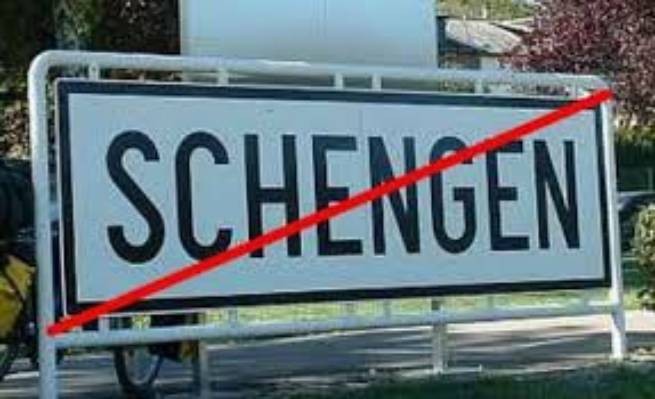Recent migration events in Germany and Hungary have cast serious doubt on the future of the Schengen area, which unites 420 million people.
Is the Schengen area, one of the most tangible and well-known achievements of European integration, in its death throes, one wonders? question Euronews.
Even during the most severe financial crisis ten years ago EU was trying with all its might to save its achievement – the eurozone. At that time, Schengen proved to be the mainstay of maintaining uninterrupted trade.
However The mass arrival of asylum seekers in 2015 upended the political agenda and brought migration to the forefront. Governments have struggled to placate angry electorates, favouring short-term measures. Hungary, Austria, Slovenia, Denmark and Sweden are among those citing an unprecedented influx of migrants to introduce temporary checks at bordersthereby destroying the illusions about the inviolability of the Schengen zone.
The next unexpected blow was dealt COVID-19 pandemicAt the time, countries were trying to contain the spread of the deadly virus, closed the borders. In Brussels, they hoped that with the start of vaccinations, the infection rate would decrease and free movement would reopen in the bloc. Hopes were justified, but… not for long. The topic of the steady growth of migration flows to the European Union.
Last year Asylum applications reach 1.12 million – the highest since 2016! From the Netherlands to Italy, local authorities complained of overcrowded refugee reception centres. Elections saw support for hardliners and far-right parties surge, and the once-unthinkable idea of moving asylum procedures to other countries went mainstream.
Against this background, it happened attack in german Solingenwhich left three people dead in August. The terrorist group Islamic State claimed responsibility for the stabbing, and the perpetrator was a Syrian citizen whose asylum application had previously been rejected and he was ordered to return to Bulgaria, his first country of entry into the EU.
Immediate deportation failure renews migration debate: Conservatives have lashed out at Chancellor Scholz's federal government and demanded unconventional solutions. Scholz has promised a tougher line and ordered tighten checks at the country's land borders. Nancy Feser, Germany's interior minister, said recently:
“We want to reduce illegal migration. To this end, we are taking further steps beyond the current comprehensive measures.”
Donald Tusk, the Polish Prime Minister, called the German authorities' decision “unacceptable”: “This is a de facto suspension of the Schengen agreement on a large scale.” A Austria stressed that it will not accept any migrant who is rejected by Germany.
The European Commission is extremely careful in its comments so as not to anger the bloc's most influential capital, Berlin: According to the Schengen Borders Code, Member States have the right to implement internal border controls to address “a serious threat, whether to public policy or internal security, where necessary and proportionate”.
The dark forebodings were aggravated after Hungary threatens to send illegal migrants to Belgium in retaliation for €200 million fineimposed by the European Court. Budapest also faces criticism for distributing its National Card scheme to citizens of the Russian Federation and Belarus. According to the European Commission, this will allow sanctions to be circumvented and could threaten the security of the entire Schengen area.
In essence Internal border checks are contrary to the spirit of Schengenwhich was conceived as a common area without passport control, so that citizens could travel comfortably to 29 countries, sometimes without even presenting any documents.
The project is based on collective efforts to control external borders and ensure fair treatment of asylum seekers. Member States trust each other to do their jobs and apply the relevant laws before allowing entry.
The logic of Schengen has been publicly questioned by several member states, such as Austria and Hungary, which argue that the EU has failed to protect its external borders and, as a result, became unable to cope with illegal migration.
European Commission data shows that since 2006, member states have submitted 441 notifications to reintroduce border checks, with only 35 of these submitted before 2015. Checks are currently in place in eight Schengen countries, including Germany. These figures refute the thesis that border controls “should be exceptional and used only as a last resort”, as the Schengen Borders Code states, and demonstrate how widely the measure is applied beyond the statutory six-month period.
In a report published in April, the European Commission called the phenomenon “a matter of particular concern” and called on countries to gradually phase out temporary controls “in order to more sustainably address common problems together.”
Member states have traditionally been reluctant to heed the EC’s calls on issues they jealously guard as national competences. Resistance to abolishing border checks is well documented: in 2022, the European Court of Justice ruled that Austria had illegally extended its control zones with Hungary and Slovenia. Nevertheless, Vienna continues to apply them, using various reasons to justify them.
Schengen countries have the right to introduce temporary checks at internal borders. But the legality of border checks is not the only element under scrutiny: their effectiveness in curbing illegal migration is also controversial, with checks carried out with varying degrees of intensity and thoroughness. Dr Saila Heinikoski, a senior research fellow at the Finnish Institute of International Affairs, told Euronews:
“I doubt that Schengen countries will want to abolish border controls in the near future because of the signal that would be sent. Checks are often carried out selectively, for symbolic purposes: to show citizens, other EU countries and potential migrants that there is an exceptional situation in Europe that the government is paying attention to.”
Member states are clinging to this “last resort”. Earlier this year they gave their final consent to reform of the Schengen Borders Codewhich extends the legal timeframe for border controls from six months to two years, it can be extended twice for a further six months if the country claims a security threat remains.
The amendments also contain provisions on health emergencies and combating instrumental migration, which expand national powers to control movements, including by reducing the number of border crossing points.Notably, countries are being asked to use “alternative measures” before resorting to border controls.
Germany's decision after the revised version came into force shows that the appetite for these “alternative measures” remains low. After all, the Schengen area is a political construct: it can be amended or abolished. Alberto-Horst Neidhardt, a senior policy analyst at the European Policy Centre, says:
“We must not forget that Schengen was created by an intergovernmental agreement. The history of Schengen is closely linked to the history of the EU asylum system, which means that it is based on the logic of security-oriented border controls. Schengen is not on the verge of death. But recent events show that the idea that the recent reforms would preserve the borderless area as such was an illusion. The future of Schengen is likely to remain unstable and uncertain.”







More Stories
The New York Times shared details of the pager operation
Murder suspect Farion asks to be left alone "behind bars"
Ukrainian Diaspora Abroad